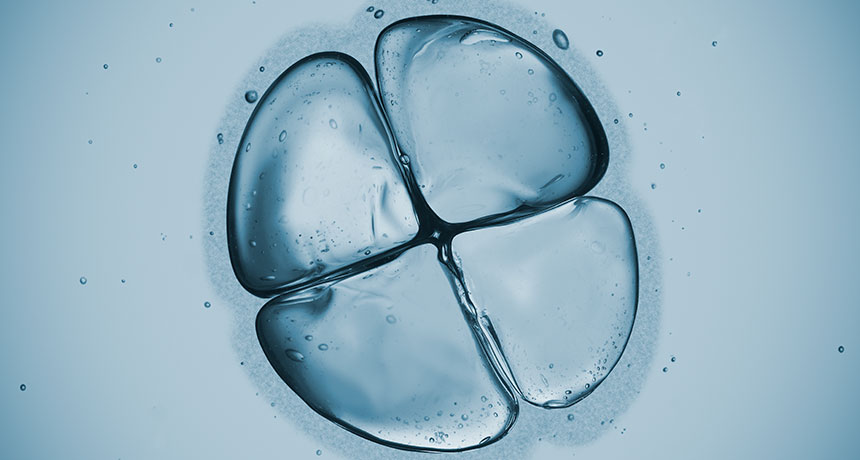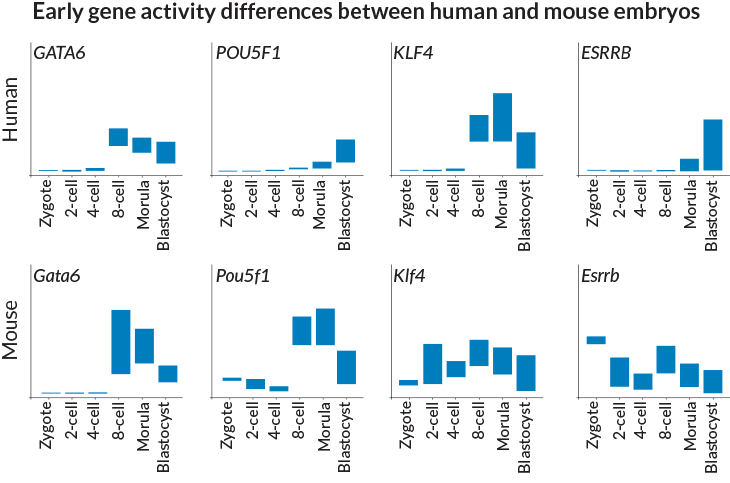
IN THE BEGINNING Early embryos (a four-cell embryo shown) from mice and humans look the same on the outside, but gene activity studies show some big differences under the hood.
Ugurhan Betin/iStockphoto
In the first days after an egg is fertilized, throwing a few key genetic switches revs up human embryo development, two new studies suggest.
That ignition pattern differs from the one that fires up early mouse embryos, the research finds.
One study, to be published online September 11 in Nature Communications, found that a much smaller number of genes than previously believed serve as the ignition switch for human embryo development.
A second study, by a different research group, tracked human and mouse embryo development from fertilized egg to about six days later, just before the embryo implants in the uterine wall. Timing and some genetic programming during development vary between the two species, researchers report online August 20 in Development.
Delving into the earliest embryonic events may give researchers new insights into infertility and human development, says Janet Rossant, a developmental biologist at the Hospital for Sick Children and the University of Toronto. She wasn’t involved in either study. “We have a lot of information about mouse development at these very early stages,” Rossant says, “but when we start looking at humans they are very different.”
Human and mouse embryos superficially look alike in the initial stages of development. Both develop from a fertilized egg, or zygote. It splits into two cells, then four, eight, 16 and so on. But below the surface, “there are big differences in early development of species,” says Juha Kere, a molecular biologist at the Karolinska Institute in Huddinge, Sweden. Kere and colleagues examined RNA in single cells from 300 human embryos. Couples undergoing in vitro fertilization had donated the embryos for research.
When a gene becomes active, the gene’s DNA instructions are copied into RNA. Kere’s group used a technique call RNA sequencing to identify which genes turned on and off in zygotes and embryos at the four- and eight-cell stages. It quickly became obvious why embryo development differs on the molecular level between species, Kere says: Many of the genes that become active early in human embryo development don’t exist in rodents.
At the four-cell stage of human development, 32 genes become active; 129 power up at the eight-cell stage, Kere and colleagues report. That is far fewer than the more than 2,000 genes previously reported to be active in early embryos. Kere and colleagues used a new technique to measure amounts of RNA that is more precise than other ways to estimate RNA quantities, Kere says.
Story continues after sidebar
Getting started

In the first few days after fertilization, both human and mouse embryos initiate genetic programs that will help build complete organisms. Timing of gene activity can differ between the two species, as seen for four genes in very early embryos. Shown are ranges of relative RNA abundance produced by each gene. Generally, human embryos ramp up gene activity at the eight-cell stage. Mice turn on some genes much earlier. In the morula stage, about four days after fertilization, the embryo is a tightly packed ball of cells and resembles a raspberry.
Rossant says she would be surprised if so few genes spark embryo development, but she doesn’t doubt that the genes Kere’s group identified are involved. “It may well be that the ones they have pulled out at the top of the heap will be important,” she says.
Many of the genes encode proteins known as PRD-like homeodomain transcription factors. Homeodomain transcription factors are proteins that latch on to specific stretches of DNA and turn on genes. Such proteins are known for establishing body plans in organisms including humans. But the proteins of the PRD-like variety aren’t well-known, and researchers probably wouldn’t have guessed that they would be the key to starting embryos’ motors, Kere says.
Scientists weren’t even sure that many of the 32 genes were real. Computer programs predicted that they encoded proteins, but researchers hadn’t previously found RNA or protein produced from them in any other human tissues. Kere speculates that the genes are turned on only at these very early stages and not again. They work like a car’s ignition system, he says. “They’re only used at the very beginning to start the embryo. Once you get the process started, you don’t need these genes anymore.”
Still other genes, including some used to reprogram adult cells into embryonic-like ones, work differently in mouse and human embryos, developmental biologist Kathy Niakan of the Francis Crick Institute in London and colleagues report in Development. Her team also sequenced RNA from single embryonic cells to determine when genes are active. Embryos from the two species share many similarities, Niakan says, but the researchers also found many differences, including timing.
For instance, a gene called POU5F1 becomes active in human embryos starting at about the eight-cell stage. In mouse embryos, the gene is active in zygotes; its RNA dips in abundance but rises again at the eight-cell stage. The gene also seems to work with different partners in mouse and human embryos, the researchers discovered.
Niakan’s group also examined embryos at the blastocyst stage, some six to seven days after fertilization and before the embryo implants in the uterus. A blastocyst is a hollow ball of cells surrounding a cluster of flexible cells called embryonic stem cells. The outer cells of the ball later help form the placenta, while the embryonic stem cells inside will give rise to all other cell types in the body. The researchers discovered that a cell-to-cell communication protein called TGF-beta keeps human embryonic stem cells flexible, or pluripotent, and able to produce any cell type. That protein doesn’t appear to be as important for mouse embryos, the team found.
Such work may help researchers make more reliable and flexible reprogrammed stem cells for replacing diseased or damaged organs, Rossant says.
Editor’s note: This article was updated on September 9, 2015, to include an additional image and again on September 15, 2015, to correct an error in the graph.






